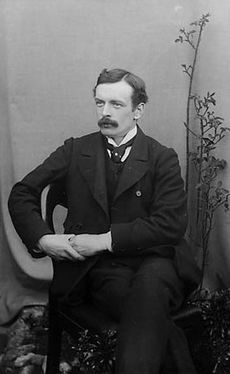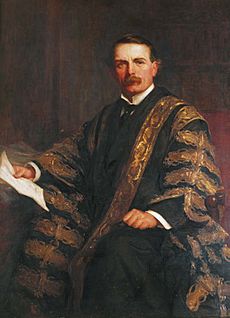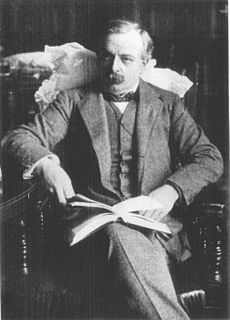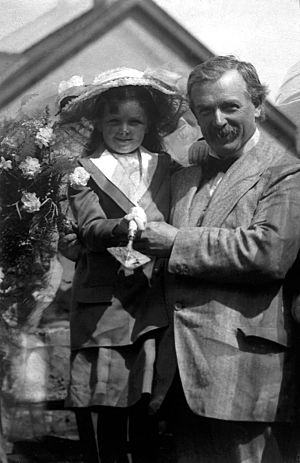David Lloyd George facts for kids
Quick facts for kids
David Lloyd George
OM []
|
|
|---|---|
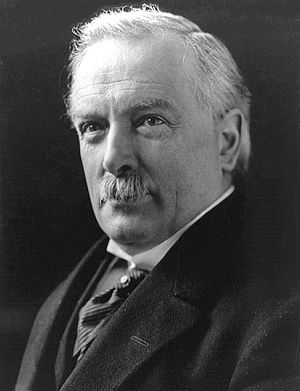
Lloyd George c. 1919
|
|
| Prime Minister of the United Kingdom | |
| In office 6 December 1916 – 19 October 1922 |
|
| Monarch | George V |
| Preceded by | H. H. Asquith |
| Succeeded by | Bonar Law |
| Leader of the Liberal Party | |
| In office 14 October 1926 – 4 November 1931 |
|
| Preceded by | H. H. Asquith |
| Succeeded by | Herbert Samuel |
| Secretary of State for War | |
| In office 6 July 1916 – 5 December 1916 |
|
| Prime Minister | H. H. Asquith |
| Preceded by | The Earl Kitchener |
| Succeeded by | The Earl of Derby |
| Minister of Munitions | |
| In office 25 May 1915 – 9 July 1916 |
|
| Prime Minister | H. H. Asquith |
| Preceded by | Office established |
| Succeeded by | Edwin Montagu |
| Chancellor of the Exchequer | |
| In office 12 April 1908 – 25 May 1915 |
|
| Prime Minister | H. H. Asquith |
| Preceded by | H. H. Asquith |
| Succeeded by | Reginald McKenna |
| President of the Board of Trade | |
| In office 10 December 1905 – 12 April 1908 |
|
| Prime Minister |
|
| Preceded by | The Marquess of Salisbury |
| Succeeded by | Winston Churchill |
| Father of the House of Commons | |
| In office 31 May 1929 – 13 February 1945 |
|
| Preceded by | T. P. O'Connor |
| Succeeded by | The Earl Winterton |
| Member of the House of Lords | |
| Hereditary peerage 1 January 1945 – 26 March 1945 |
|
| Succeeded by | The 2nd Earl Lloyd-George of Dwyfor |
| Member of Parliament for Carnarvon Boroughs |
|
| In office 10 April 1890 – 13 February 1945 |
|
| Preceded by | Edmund Swetenham |
| Succeeded by | Seaborne Davies |
| Personal details | |
| Born | 17 January 1863 Chorlton-on-Medlock, England |
| Died | 26 March 1945 (aged 82) Llanystumdwy, Wales |
| Resting place | Llanystumdwy, Wales |
| Political party |
|
| Spouses |
Margaret Owen
(m. 1888; died 1941)Frances Stevenson
(m. 1943) |
| Children | 5, including:
|
| Occupation |
|
| Signature | |
| n.b. Styled as "The Earl Lloyd-George of Dwyfor" from 12 February 1945, he died before he could take his seat in the House of Lords. His peerage title was hyphenated even though his actual surname was not. | |
David Lloyd George (born 17 January 1863 – died 26 March 1945) was a very important British politician. He was the Prime Minister of the United Kingdom from 1916 to 1922. He belonged to the Liberal Party.
Lloyd George is famous for leading Britain during the First World War. He also introduced new social welfare laws, like the National Insurance Act 1911, which helped people who were sick or unemployed. After the war, he played a big part in the peace talks and helped create the Irish Free State. He was the last Liberal Party prime minister to lead Britain.
Contents
Early Life and Welsh Roots
David Lloyd George was born on 17 January 1863 in Chorlton-on-Medlock, England. His parents were Welsh. When he was very young, his family moved back to Pembrokeshire and then Llanystumdwy, Caernarfonshire, in Wales. He grew up speaking Welsh.
His father, a schoolteacher, died when David was just over a year old. David was then raised by his mother and her brother, Richard Lloyd. Richard was a shoemaker and a strong supporter of the Liberal Party. He greatly influenced David and encouraged him to study law and get into politics. David even added his uncle's last name, Lloyd, to his own, becoming "Lloyd George."
Starting a Legal Career
Lloyd George became a solicitor (a type of lawyer) in 1884. He opened his own law office in 1885. He is the only solicitor to have ever become Prime Minister of the UK.
He quickly became known for his legal work. One famous case was the Llanfrothen burial case. This case helped people who were not part of the official Church of England get buried in church cemeteries according to their own beliefs. This was a big victory for religious freedom in Wales.
Early Steps in Politics
Lloyd George became active in local politics. He was elected as an alderman (a senior member of a local council) in Carnarvonshire in 1889. He also became a Justice of the Peace (a local judge).
He was chosen as the Liberal candidate for Carnarvon Boroughs. In 1890, he won a special election to become a Member of Parliament (MP). He stayed an MP for this area for 55 years! At that time, MPs were not paid, so he continued his law practice in London and Wales to support his family.
A Voice for Wales
Lloyd George was a strong supporter of Wales. He wanted Wales to have more control over its own affairs, a process called devolution. He also wanted the Church of England to be separated from the government in Wales. This was called "disestablishment."
He helped create a group of Welsh Liberal MPs. They pushed for these changes, along with reforms for workers and farmers. He believed that Wales should manage its own affairs.
Supporting Welsh Culture
Lloyd George also helped establish important Welsh institutions. These included the National Library of Wales and the National Museum of Wales. He also supported the University of Wales, arguing it needed more funding.
Rising to Power
Lloyd George became well-known for speaking out against the Second Boer War (1899-1902). He argued that the war was too costly and prevented important social reforms in Britain. He also questioned the war's purpose and criticized those who profited from it.
He also strongly opposed the Education Act 1902. This law gave more control and money to religious schools, which upset many non-Anglican groups. Lloyd George led a campaign in Wales against the act, using the slogan "no control, no cash." His strong leadership during this time made him a prominent figure in British politics.
President of the Board of Trade
In 1905, Lloyd George joined the government as President of the Board of Trade. This role involved managing trade and industry. He helped stop a big railway strike by getting unions and companies to agree.
Chancellor of the Exchequer
In 1908, he became Chancellor of the Exchequer (the minister in charge of the country's money). He wanted to fund new social programs.
The People's Budget
In 1909, Lloyd George introduced his "People's Budget." This budget proposed new taxes on land, high incomes, and luxuries. The goal was to raise money for social welfare programs, like pensions and unemployment insurance.
The House of Lords, which was mostly made up of wealthy landowners, rejected the budget. This caused a big argument about who had more power: the elected House of Commons or the unelected House of Lords. After two elections in 1910, the budget was finally passed. The Parliament Act 1911 also limited the House of Lords' power to block laws.
Liberal Reforms and Welfare State
Lloyd George was key in bringing in the "Liberal Reforms." These included the National Insurance Act 1911, which provided financial support for sick and unemployed people. These reforms were the beginning of Britain's modern welfare state, helping to protect people from poverty.
First World War Leader
When the First World War began in 1914, Lloyd George was still Chancellor. He helped manage Britain's finances during the war.
Minister of Munitions
In 1915, he became the first Minister of Munitions. This was a new job created to make sure the army had enough weapons and ammunition. He worked very hard to increase production, setting up new factories and solving labor problems. His efforts were crucial in making sure British soldiers had the supplies they needed.
Secretary of State for War
In June 1916, Lloyd George became Secretary of State for War. He wanted to see more action and better strategies on the battlefield. He often disagreed with the generals about how to fight the war.
Prime Minister During Wartime
In December 1916, the Prime Minister, H. H. Asquith, resigned. Lloyd George took over, becoming Prime Minister. He formed a small "War Cabinet" to make quick decisions. He also created a group of advisers known as the "Garden Suburb."
He introduced food rationing and encouraged farming to deal with food shortages. He also pushed for the convoy system to protect ships from German submarines. This helped greatly reduce shipping losses.
Lloyd George faced tough decisions, including the costly Battle of Passchendaele. He worked to bring the Allied forces under one command, which helped turn the war in their favor by 1918. Britain and its allies won the war in November 1918.
Post-War Prime Minister
After the war, Lloyd George was very popular. In the "Coupon election" of December 1918, his coalition government won a huge victory. He promised to make Britain "a country fit for heroes to live in."
Paris Peace Conference
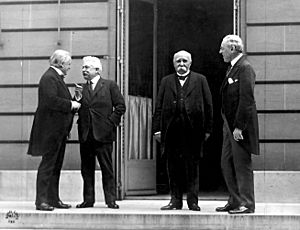
Lloyd George represented Britain at the Paris Peace Conference in 1919. He worked with leaders from France, the USA, and Italy to create the Treaty of Versailles. He tried to be fair to Germany, not wanting to completely destroy its economy.
Social Reforms After the War
His government introduced many social reforms after the war:
- The Education Act 1918 raised the school leaving age to 14.
- The Housing and Town Planning Act 1919 provided money for local councils to build new homes. This helped establish that housing was a social service.
- The Representation of the People Act 1918 gave the right to vote to all men and many women over 30.
- The Unemployment Insurance Act 1920 expanded unemployment insurance to almost all workers.
- The Ministry of Health was set up in 1919, leading to big improvements in public health.
Irish Independence
During his time as Prime Minister, the situation in Ireland was very difficult. After a period of conflict, Lloyd George negotiated with Irish leaders. This led to the Anglo-Irish Treaty in 1921. As a result, Southern Ireland became the Irish Free State in 1922, gaining independence from the UK.
Fall from Power
By 1922, Lloyd George's government faced several problems. The economy was struggling, and there were many strikes. There was also a scandal about him selling honors (like titles) to rich businessmen for money. Many members of the Conservative Party, who were part of his coalition, decided they no longer supported him.
On 19 October 1922, the Conservatives voted to end the coalition. Lloyd George resigned as Prime Minister that same day. He never held office again.
Later Political Life
After leaving office, Lloyd George remained an important figure in politics. He still had a lot of money from his time in power, which he used to support Liberal candidates and new policy ideas.
He became the leader of the Liberal Party from 1926 to 1931. He proposed new ideas for public works to reduce unemployment, but the party did not win many more seats in elections. In 1929, he became the "Father of the House," meaning he was the longest-serving MP in the House of Commons.
Final Years
In his later years, Lloyd George was less involved in daily politics. He published his "War Memoirs," sharing his experiences from the First World War.
In 1940, he gave a powerful speech that helped lead to Winston Churchill becoming Prime Minister during the Second World War. Churchill offered him a job in his government, but Lloyd George declined.
In 1945, shortly before his death, he was given the title of Earl Lloyd-George of Dwyfor. He died on 26 March 1945, at the age of 82. He was buried near his childhood home in Llanystumdwy, Wales.
Family Life
Lloyd George had five children with his first wife, Margaret Owen, whom he married in 1888. His children were Richard, Mair, Olwen, Gwilym, and Megan. Mair sadly died young.
Two of his children, Gwilym and Megan, followed in his footsteps and became Members of Parliament.
Lloyd George later married his long-time secretary, Frances Stevenson, in 1943. She is known for her diaries, which give insights into his political life.
Honours and Legacy
Lloyd George received many honours during his life. He was made an Order of Merit in 1919. He also received high honours from France and Belgium. Many universities gave him honorary degrees.
Several places are named after him, including Lloyd George Avenue in Cardiff, Mount Lloyd George in Canada, and a school in Vancouver.
Lloyd George is often seen as one of Britain's most important prime ministers. He is remembered for his social reforms and for leading Britain to victory in the First World War.
Images for kids
-
Lloyd George with Japanese Prince Hirohito, 1921
-
Portrait of David Lloyd George by Hal Hurst, 1915
-
Vera Weizmann, Chaim Weizmann, Herbert Samuel, Lloyd George, Ethel Snowden, and Philip Snowden
-
Grave of David Lloyd George, Llanystumdwy
-
Lloyd George arms
See Also
 In Spanish: David Lloyd George para niños
In Spanish: David Lloyd George para niños
 | Shirley Ann Jackson |
 | Garett Morgan |
 | J. Ernest Wilkins Jr. |
 | Elijah McCoy |


